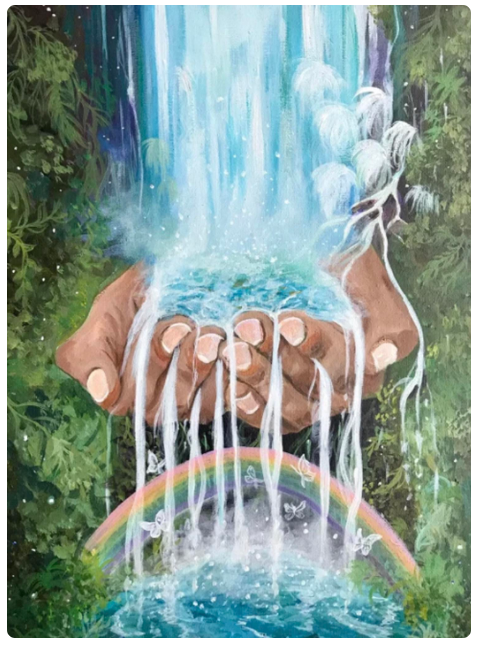The story of John Paton, whose God made rain come from the earth!
I love reading missionary biographies but there is something extra special about autobiographies. I love the way they give us a firsthand perspective of a time that is not our own. For this reason, I was excited to read “The Story of John Paton or Thirty Years Among South Sea Cannibals” in the All Nations Book Club. (https://www.gutenberg.org/files/28025/28025-h/28025-h.htm)
I have read a lot of books about missions and missionaries, but before reading this book, I knew next to nothing about the work done in The New Hebrides or Vanuatu as it is called today. Vanuatu is a group of islands in Oceania which was first approached by missionaries in 1839. John Paton arrived with his first wife Mary Ann and settled on the island of Tanna in November of 1858.
The Days of Small Beginnings on the Island of Tanna
John Paton was born in Scotland in 1824, the eldest of 11 children. His parents were devout Christians and dedicated their firstborn for “service in foreign missions.” At the age of 34, after a number of years of ministry in Glasglow’s inner city, God called him to foreign missions.
After arriving on the island of Tanna (in present day Vanuatu) he was met with hostility from the locals, a hostility which never entirely ceased during the four years he was on the island. Despite opposition from the islanders and losing his wife and infant son to illness within the first months of arriving, he pressed on in his work.
The Missionaries from Aneityum and the First Martyr
Paton was not working alone, however. He had brought with him a number of Aneityum “Teachers” (missionaries from the island of Aneityum, which had been previously evangelized).
As I read the incredible stories of Paton’s life and ministry on Tanna, I applauded his courage, persistence and even at times his wit. Nevertheless, what stood out to me was not the horrific stories of cannibalism or the apparent treachery of the Tannese but the universal truths that all followers of Jesus share. Though our experiences are separated by time, location, culture, and pretty much every other way possible, one thing remains the same – we all serve the same living God!
No matter where we are and what we are doing “Jesus Christ is the same yesterday and today and forever!” Hebrews 13:8
One of Paton’s Aneityum fellow missionaries had been chased from his home and savagely beaten. When Paton urged him to move into the Mission House instead of living among the Tanna natives, the Aneityumese missionary declared, “…when I see them thirsting for my blood, I just see myself when the missionary first came to my island. I desired to murder him, as they now desire to kill me. Had he stayed away from such danger, I would have remained heathen; but he came, and continued coming to teach us, till by the grace of God, I was changed to what I am. Now the same God that changed me to this can change these poor Tannese to love and serve Him” (pg. 111).
On hearing this Paton, decided “It was not in me to keep such a man, under such motives, from what he felt to be his post of duty” (pg. 111). And so he let the Aneityum missionary return to the village where he had been working. Three weeks later, this man became the first martyr on Tanna, praying with his last breath, “O Lord Jesus, forgive them, for they know not what they are doing…Take not away Thy Worship from this dark island! O God, bring all the Tannese to love and follow Jesus!” (p. 111)
Over a century and half later we can sit around and debate the methods used, the quality of conversions, etc. but we cannot take away the testimony of men like this unnamed Aneityum follower of Jesus. And the same is true for us today.
John Paton and his fellow Anetyumese missionaries, despite being miraculously rescued from certain death many times, were eventually chased off Tanna by the islanders. Paton spent the next few years traveling around Australia and Scotland raising money for a mission ship and recruiting new missionaries.
New Beginning on the Island of Aniwa
In 1866, Paton married again and moved back to the New Hebrides (Vanuatu). This time his family settled on the island of Aniwa (which is close to Tanna). Together Paton and his wife, Margaret, over the next 30 years established a church, along with an orphanage and a school.
Paton was met with challenges similar to those he experienced on Tanna. but the harvest was ripe in Aniwa. Within three years of arriving Aniwa, the world was blessed with the first Aniwan believers.
“For three years we had toiled and prayed and taught for this. At the moment when I put the bread and wine into those dark hands, once stained with the blood of cannibalism, but now stretched out to receive and partake the emblems and seals of the Redeemer’s love, I had a foretaste of the joy of glory that well-nigh broke my heart to pieces. I shall never taste a deeper bliss till I gaze on the glorified face of Jesus Himself” (Pg 355-356).
The moment came after working closely with a man named Namakei, one of the older chiefs.
The Turning Point on Aniwa
Since Aniwa had no sources of freshwater Paton decided to try to sink a well. The islanders laughed at him. “Rain cannot be found under the ground,” they insisted. But Paton, prayed and persisted in digging. Thirty feet down he struck fresh water, to the surprise and wonderment of all the Aniwan people. On witnessing this miracle, the old Chief Namakei asked, “Will you let me preach a sermon on the well?” Without hesitation Paton agreed. On the next Sunday, with a great crowd gathered, Namakei delivered his sermon.
“Since Missi [this is the local term for “missionary”] came here he has talked many strange things we could not understand… and we said regarding many of them that they must be lies. But of all his wonderful stories, we thought the strangest was about sinking down through the earth to get rain! ... But the Missi prayed on and wrought on, telling us that Jehovah God heard and saw, and that his God would give him rain. Was he mad? … We mocked at him; but the water was there all the same. We have laughed at other things which Missi told us, because we could not see them but from this day I believe that all he tells us about his Jehovah God is true …. The Jehovah God has sent us rain from the earth. Why should He not also send us His Son from Heaven!” He then urged all that believed the same to bring their idols and to burn them and to openly listen and learn from Paton.
In this spectacular turning point in Paton’s ministry what moved me most was not the obvious changing of hearts and the casting off of idolatry. What moved me the most was Paton’s trust in the old chief, to allow him to address the people. We are not told whether Paton questioned or coached him but we know that he allowed him to maintain his authority before the people so that he could, in his own words: persuade them to join him in becoming a Jesus follower. In so doing he allowed the Gospel to flow through the natural lines of relationship and gave the people ownership over their own conversion.
Who are you disciplining? Do they have access to a network of people? Who trusts them? Have they told them the Gospel? Allow the Gospel to flow through networks of families and friends!
John Paton witnessed the printing of the Aniwan New Testament in 1899, as well as saw missionaries placed on most of the islands of Vanuatu before he died in 1907. His own son later took the Gospel back to Tanna.
The Power of Testimony
The power of our testimony is something that cannot be denied. The Scriptures themselves speak of the power of a life transformed:
“They triumphed over him by the blood of the Lamb and by the word of their testimony; they did not love their lives so much as to shrink from death.” Revelation 12:11
This book contains not only the testimony of John G. Paton but also the story of the Aneityumese martyr on Tanna, the story of Namakei (the chief on Aniwa), and many others. This makes the story powerful and potentially life transforming (if we let it). Each of these testimonies makes it clear that the contrast between who we were before meeting Jesus and who we have become after following Him is a powerful witness to God’s power.
The transformation of an individual speaks louder than “perfect” methodology or “carefully crafted” doctrine. Personal transformation is the universal truth that binds us together as followers of Jesus. He has changed us – made us into a new creation, rescued us from destruction and elevated us to children of God. Whether we were saved out of cannibalism or capitalism makes no difference, we were all saved out of sin and one day we will worship together around the throne!
I will leave you with one more Paton quote…
“Oh, I wonder, I wonder when I see so many good ministers at home, crowding each other’s heels whether they would not part with all their home privileges, and go out…” (Page 356). Paton knew the joy of watching the transforming power of Jesus enter into individuals, places, and cultures for the first time.
Do you long to experience that kind of joy? What has Jesus done in your life? What has His goodness compelled you to do? Who have you told lately about the transforming power of Jesus Christ?
About the Author: Amber is passionate about training and mobilizing missionaries. After nine years in Asia, she is currently teaching in California, where she enjoys gardening, sewing and reading.
Get Connected & Let’s Grow Together!
We invite you! Here are some amazing resources you may find interesting including:
Lessons from the Least, the Last, and the Lost, All Nations Weekly Devotion by Blake Staton, M.Div.
All Nations Pocket Guide to Church Planting by Dr. Pam Arlund (in many languages)
All Nations Storytelling Resource
Mission’s Edge, a monthly roundtable learning opportunities with ministry and missions leaders! Sign-up for any of these today and participate! Let’s grow together!
To receive All Nations International leadership updates (including International Executive Leader Dr. Mary Ho’s monthly emails) and prayer needs, link HERE.
To participate or learn about our monthly global prayer for the neglected people around the world, signup HERE. We meet on the last Thursday of each month at 8 am CST (US). We encourage everyone to join in as we pray that Jesus will be worshiped by all peoples of the earth — the least, the last, and the lost! Register HERE to receive a monthly video prayer invite.







